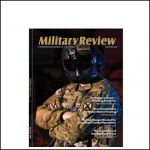
e-Document
|
Military Review, January-February 2004.
Copies
0 Total copies, 0 Copies are in,
0 Copies are out.
Targeting in post-conflict operations in Iraq. LT COL Dominic J. Caraccilo, U.S. Army, and MAJ Andrew M. Rohling, U.S. Army; The 2d Battalion (Airborne), 503d Infantry Regiment, parachuted into northern Iraq, seized Kirkuk, conducted raids, and after Baghdad fell, set up an independent Kirkuk police force and public service system. They used the methodology of the targeting process to focus on nontraditional targets, such as the citys infrastructure, and developed effective ROE for post-conflict operations.
Effects-based operations and the exercise of national power. MAJ David W. Pendall, U.S. Army; As the United States faces 21st-century adversaries and national security challenges, we must acknowledge the threats as being different from threats faced in the 20th century and develop new strategies. Effects-based operations, as a core competency of future warfare, will leverage allies kinetic and non-kinetic capabilities with global reaching effects.
Field artillery at the crossroads of transformation. LT COL Tommy James Tracy, U.S. Army; The Crusader cannon artillery acquisition project has been canceled, which lends credence to the thought that a mechanized army equipped with heavy weaponry is no longer needed. The question is whether the Army should continue to place importance on such legacy items as heavy tanks and cannon. This article joins the debate.
Information operations in support of special operations. LT COL Bradley Bloom, U.S. Army; To meet the challenges the Army faces in the post-11 September 2001 operating environment, the Special Operations Forces community must develop flexible, durable staff organizations to deliver focused, coordinated information operations products to enhance mission accomplishment.
Joint fires evolution. MAJ Eric C. Braganca, U.S. Air Force; During Operations Enduring Freedom and Iraqi Freedom, special operations forces made great progress in integrating joint fires. With the Air Force, they came up with innovative joint fires solutions to capture oil fields, prevent SCUD attacks, and secure military objectives in Iraq before conventional forces arrived.
Implementing a unit manning system. COL Eli T.S. Alford, U.S. Army; Twenty years ago, Military Review published an article by General Donn A. Starry in which he proposed a framework for implementing effective change in the Army. Today the Army is again examining unit manning to determine what the Army needs for the future, even if it means looking toward the past instead of to the future.
The army profession: ostrich or phoenix? [General Douglas MacArthur Military Leadership Writing Award], MAJ Sean Herron, U.S. Army; Army officers routinely engage in robust discussions about what it means to be a professional soldier, but the Army as an institution might be losing its professional status. Herron, the 2003 winner of the MacArthur Military Leadership Writing Competition at the U.S. Army Command and General Staff College, sees the Army as being regarded increasingly as just another government agency.
Chinas cruise missile program. COL Geoffrey T. Lum, U.S. Air Force; During Operations Desert Shield and Desert Storm, U.S. Tomahawk cruise missiles hit 80 percent of their targets. China noted this magnificent performance and began developing and acquiring cruise missiles for possible use against Taiwan, to bridge the technology gap between China and America, and to deter any U.S. intervention in East Asia. The military must prepare now to face this new threat.
Review Essays
Embedded: the media at war in Iraq. George Ridge, Professor, University of Arizona, Tucson; The Pentagon, seeking a way to satisfy editors pushing to cover the war from the front alongside troops in real time, came up with a solution: resurrect embedding for independent, uncensored reporters. There is no way to back out of the embedding process. Its here to stay.
A short history of the Moroccan Armed Forces. LT CDR Youssef H. Aboul-Enein, U.S. Navy; Morocco, the first country to recognize the United States as a nation, has long been a Middle East ally to the United States. Assessing the relationship between Moroccans and Americans could further the understanding between the two countries, helping to capitalize on Arab and Muslim military potential.
Book Reviews Contemporary readings for the professional
Title
Military Review, January-February 2004.
Call No
CDMC Military Review
Digital Link
Subjects
Effects-based operations (EBO) Field artillery Fire support Post conflict operations Iraq Joint fires evolution Operation Enduring Freedom (OEF) Operation Iraqi Freedom (OIF) Lessons learned Leader development training Regimental manning systems Effects-based targeting Morocco Information operations Press Army logistics innovation agency Cruise missile defense China MacArthur Military Leadership Writing Award
Language
English
Published
Fort Leavenworth, KS : Combined Arms Center,, 2004.
Series
Target Audience
Unknown or not specified








